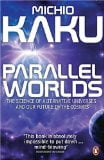 Parallel Worlds: The Science of Alternative Universes and Our Future in the Cosmos
Parallel Worlds: The Science of Alternative Universes and Our Future in the Cosmos
by Michio Kaku
Penguin Books, £8.99 (pb), ISBN 0141014636
It has become compulsory to describe any book on quantum physics as “mind-blowing”, and there’s no good reason to buck convention with this title. Authored by theoretical physicist Michio Kaku, this book covers some of the latest ideas in the search for a “theory of everything” that can unite the cosmological and quantum realms. Currently the best candidate for this over-arching theory looks to be M-theory, a form of string theory, which can unite relativity and quantum mechanics, unite the fundamental forces, and which posits the existence of multiple universes co-existing in different dimensions. It’s heady stuff, of course, and Kaku does his best to explain it all in terms familiar to the lay reader. What do the fundamental equations of string theory look like? There’s plenty of discussion of collapsing dimensions, sets of equations from one theory emerging as special cases of other theories and so on, but there’s no sign of these mysterious equations ever appearing in the text. Instead the author makes numerous references to popular fiction, particularly science fiction, and to metaphors that the average reader might easily grasp. At times these metaphors seem to be stretched a little too far, but they are clearly designed to appeal to a wider audience. There’s a fairly liberal use of religious/spiritual language, with many references to God and other mythologies. Quantum physics is already part of the tool-set of the more sophisticated mystics, charlatans and pseudo-scientists, and they will find plenty more to grab here. Given some of the implications of the latest string theories, it would be strange if the book were anything but mind-blowing. However, interesting as the subject is, the writing just doesn’t inspire, and the constant use of religious imagery is frankly distracting. It’s a shame, as there’s an interesting book buried in here; a more ruthless edit and clearer focus on the core subject would have helped immensely.
Pan Pantziarka

